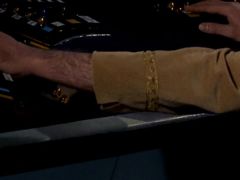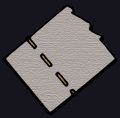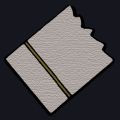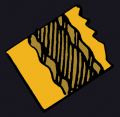Difference between revisions of "Starfleet Ranks"
m |
m (→Commodore) |
||
| Line 74: | Line 74: | ||
Flag officers had generally served in a variety of vital areas, including Exploration, Military Operations, and Fleet Command. Flag officers of Commodore rank commanded Tactical Operations Groups of three to six vessels. A Commodore could also serve as a starbase commander or fleet inspector, reporting to a Rear Admiral.<ref name="FASA2012"/> | Flag officers had generally served in a variety of vital areas, including Exploration, Military Operations, and Fleet Command. Flag officers of Commodore rank commanded Tactical Operations Groups of three to six vessels. A Commodore could also serve as a starbase commander or fleet inspector, reporting to a Rear Admiral.<ref name="FASA2012"/> | ||
<gallery> | <gallery> | ||
| − | + | rank_cdre-tos14.jpg|Commdore ([[Star Trek|TOS]] [[Court Martial (Episode)|14]]) | |
| − | |||
</gallery> | </gallery> | ||
Revision as of 17:16, 7 February 2022
Enlisted
Chief Petty Officer
The rank of Chief Petty Officer was given to non-commissioned officers who had shown exceptional leadership in their own areas. A Chief Petty Officer typically commanded a group of enlisted personnel, often independent of direct supervision by junior officer grades. In the mid-24th century, the insignia for Chief Petty Officer was one hollow gold circle worn on the right uniform lapel.[1][2]
Image Gallery
Chief Petty Officer (c.2350) (FASA2012)
Cadets
Cadet
Cadet (c.2260) (FASA2001A)
Midshipman
Midshipmen were recent graduates of Starfleet Academy who had completed their final cadet cruises. These officers were typically assigned duties as junior aides to line officers in either the technical or scientific branches of Starfleet. Midshipmen might also have been assistants to officers in foreign legions and administrative officers. Such assignments were typically between six and eighteen months in duration, after which promotion was routine.[1]
Midshipman (c.2260) (FASA2001A)
Commissioned Officers
In the mid-23rd century, stripes were 2cm wide, gold, and located 6cm from the cuff.[3]
Junior Officers
Ensign
Ensigns served as junior officers in a variety of duty stations both aboard ship and at starbases and ground installations.[1]
Ensign (c.2350) (FASA2012)
Lieutenant, junior grade
Junior grade Lieutenants aboard ship were responsible for the direct operation of non-bridge duty stations under the supervision of senior personnel. Bridge operations involving navigation and helm control were also assigned to junior grade Lieutenants under the supervision of senior officers. At ground installations, junior grade Lieutenants typically acted as station-keepers under the direction of a senior Lieutenant.[1]
Lieutenant, junior grade (c.2350) (FASA2012)
Lieutenant
See: Starfleet Lieutenant
Line Officers
Lieutenant Commander
See: Starfleet Lieutenant Commander
Commander
See: Starfleet Commander
Captain
See: Starfleet Captain
Fleet Captain
The position of Fleet Captain is that of a senior officer who has demonstrated exceptional competence and expertise in active service. Fleet Captains were responsible for the overall deployment of specific classes of vessels throughout the fleet; in that capacity, they oversaw the construction, refitting, upgrading, and operational use of a particular vessel design, rather than taking command over individual vessels.[1]
Fleet Captain (c.2350) (FASA2012)
Flag Officers
Commodore
Flag officers had generally served in a variety of vital areas, including Exploration, Military Operations, and Fleet Command. Flag officers of Commodore rank commanded Tactical Operations Groups of three to six vessels. A Commodore could also serve as a starbase commander or fleet inspector, reporting to a Rear Admiral.[1]
Rear Admiral
The rank of Rear Admiral was similar to that of other senior admirals, but Rear Admirals differed from their superiors in that their positions usually carried a specific geographical area of responsibility, such as a quadrant or sector within Federation space. Rear Admirals also commanded Task Force Groups of eight to twelve vessels, as well as important ground installations or vessels that fell within their specific area of jurisdiction. Rear Admirals could also command Starfleet ship construction and production facilities or science and weapons labs, primary base security, security for Federation officials, procurement, and scientific analysis (particularly in sensitive areas such as intelligence gathering or clandestine operations).[1]
Rear Admiral (c.2350) (FASA2012)
Admiral
The rank of Admiral was the highest in Starfleet. Admirals were responsible for the deployment of Starfleet vessels in active operations, particularly fleet operations along the border zones between the Federation and foreign governments. Admirals were also responsible for exploration and training craft, as well as Federation colonization efforts. Staff positions encompassed a variety of roles, ranging from diplomatic and scientific to traditional planning and organizational tasks within Starfleet. Separate Admiralty Commands included directorship of Starfleet training operations, diplomatic liaisons with Federation member worlds, and negotiations with newly-discovered worlds. They also included a host of military positions: contingency strategy, weapons research and development, and scientific systems deployment aboard Starfleet vessels.[1]
Notes and References
- ↑ 1.0 1.1 1.2 1.3 1.4 1.5 1.6 1.7 Stuart, Rick (Author). Star Trek: The Next Generation Officer's Manual. Star Trek: The Role Playing Game. Book 2012 . Cover design by Jim Nelson. Illustrations by Rob Caswell, David R. Deitrick, A.C. Farley, Dana Knutson, Jim Nelson, Jeff Laubenstein, and Todd F. Marsh. Deck plans by Steve Venters. Cutaway illustrations by David R. Deitrick. Ship illustrations by Dana Knutson. FASA Corporation. 1988.
- ↑ "Star Trek: The Next Generation Officer's Manual" describes the rank insignia for for Petty Officer, Petty Officer First Class, and Chief Petty Officer being one through three hollow gold circles, respectively. This has been modified to better correspond with the ranks of Petty Officer, Chief Petty Officer, Senior Chief Petty Officer, and Master Chief Petty Officer. Although outside the scope of this entry, this also explains Chief Petty Officer Miles O'Brien wearing a single hollow rank pip in later seasons of Star Trek: The Next Generation. Further, the rank of Specialist has been eliminated, which also lines the 24th century enlisted rank structure more closely to that of the 23rd century Star Fleet.
- ↑ McLimore, Guy W. Jr. et al (Authors). Basic Rulebook. Star Trek: The Role Playing Game. Book 2001A. Box Art and Original artwork by Mitch O'Connell. Ship Deck Plans by Dana Andrews, Ross Babcock, Mitch O'Connell, and Jordan Weisman. FASA Corporation. 1983.
















